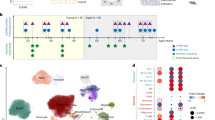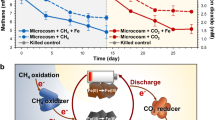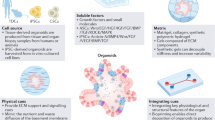Abstract
THE recent letter of Bywaters1 on this subject prompts us to describe some observations made independently in the course of a study of normal mammalian tissues showing an anærobic type of metabolism. Following our investigation of the metabolism of the medulla of kidney2, a tissue recognized as having a poor capillary supply, we were led to study cartilage because this is an entirely non-vascularized tissue, and here we found the same association of anaerobic type of metabolism and poor oxygen supply as in medulla of kidney.
This is a preview of subscription content, access via your institution
Access options
Subscribe to this journal
Receive 51 print issues and online access
$199.00 per year
only $3.90 per issue
Buy this article
- Purchase on Springer Link
- Instant access to full article PDF
Prices may be subject to local taxes which are calculated during checkout
Similar content being viewed by others
References
Bywaters, NATURE, 138, 30 (1936).
Dickens and Weil-Malherbe, Biochem. J., 30, 569 (1936).
Author information
Authors and Affiliations
Rights and permissions
About this article
Cite this article
DICKENS, F., WEIL-MALHERBE, H. Metabolism of Cartilage. Nature 138, 125–126 (1936). https://doi.org/10.1038/138125b0
Issue Date:
DOI: https://doi.org/10.1038/138125b0
This article is cited by
-
Oxidative Metabolism of Cartilage
Nature (1959)
-
Untersuchungen an Knorpeltransplantaten mit markiertem Phosphat
Die Naturwissenschaften (1958)
-
Metabolism of Tumours
Nature (1940)
-
Metabolism of Cartilage
Nature (1936)
Comments
By submitting a comment you agree to abide by our Terms and Community Guidelines. If you find something abusive or that does not comply with our terms or guidelines please flag it as inappropriate.



